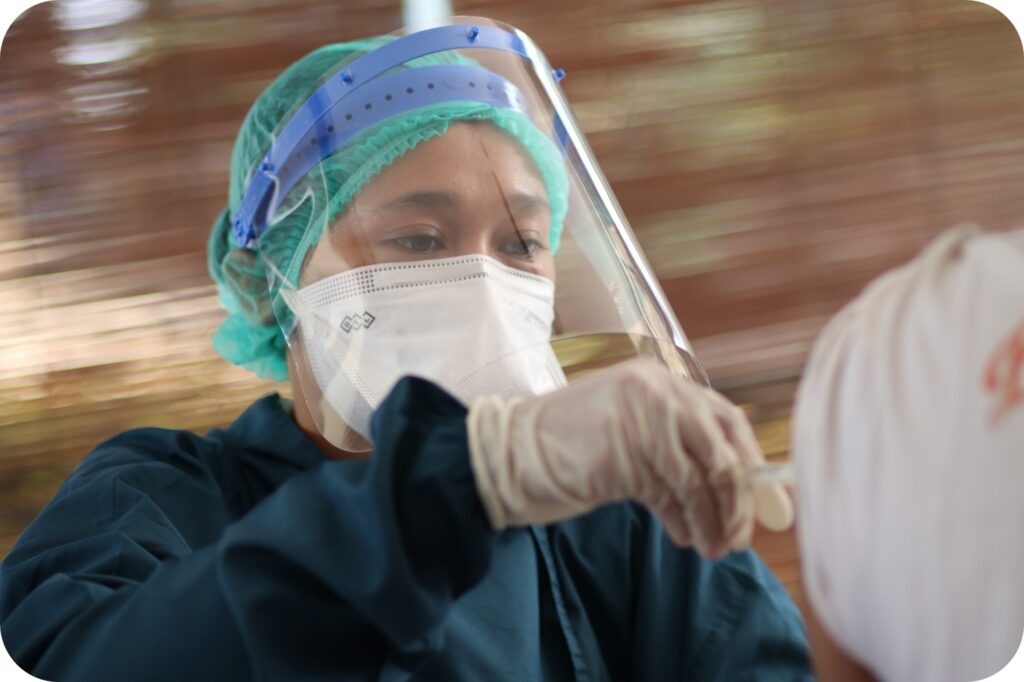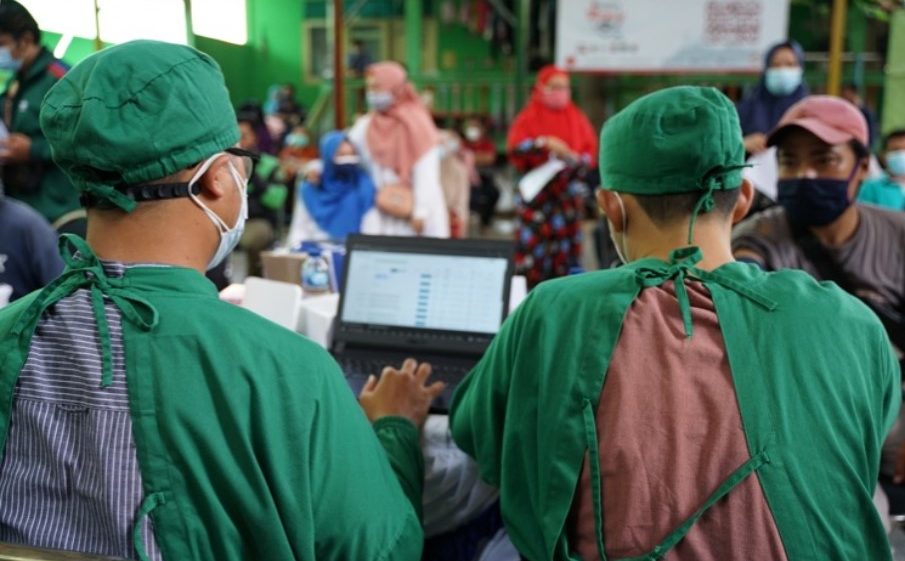Michael Cassell, Senior Technical Advisor, EpiC
Erlian Aditya, Deputy Director, EpiC Indonesia
Caroline Francis, Project Director, EpiC Indonesia
Irfan Riswan, Program Manager, EpiC Indonesia
On July 17, 2021, The New York Times identified Indonesia as the new epicenter of the COVID-19 pandemic, with the world’s highest count of new infections. Days earlier, The Wall Street Journal reported of workers having to toil around the clock to bury COVID-19 casualties in Jakarta, Indonesia’s largest city. Among the most vulnerable were front-line health workers who risked COVID-19 infection in the process of providing any form of urgent or critical care. The entire health system was at risk.
Anticipating an emerging crisis, the U.S. Agency for International Development (USAID) had recently mobilized the Meeting Targets and Maintaining Epidemic Control (EpiC) project in Indonesia to administer accelerated support to the country’s fight against COVID-19. The EpiC team, led by FHI 360, was already engaged by USAID to assist Indonesia in its response to a different pandemic threat―HIV―with resources provided through the U.S. President’s Emergency Plan for AIDS Relief (PEPFAR). By virtue of having feet on the ground and established relationships with local health officials and providers, the EpiC team was poised to bring COVID-19 assistance swiftly to Jakarta.

A volunteer administers COVID-19 vaccination in Muara Angke Village, North Jakarta on August 8, 2021, as part of an EpiC-supported collaboration with the local district health office, Puskesmas, and the head of village. During this event, 200 village residents were vaccinated. Photo: Ade Sonnyville.
In addition to addressing crucial gaps in oxygen and health care for critically ill patients, EpiC was asked to help expand vaccination coverage, one of the most pressing priorities to avert a rising tide of COVID-19 infections and deaths. Only about 15% of Indonesia’s 270 million people had received an initial vaccine dose by mid-July, and there was grave concern that essential health workers would face even greater COVID-19 exposure risks in the process of supporting vaccine rollout. Because COVID-19-related supply shortages and movement restrictions introduced mounting challenges to the provision of viral load testing for patients receiving HIV treatment, the EpiC HIV team had turned to private sector laboratories to help sustain services. As a result, it was only natural for EpiC to turn to the private sector to help accelerate access to COVID-19 vaccination.
The aim was to mobilize trained health care providers to scale up vaccination in convenient mobile settings in a manner that would not increase the already substantial burdens on essential health workers – and without increasing COVID-19 exposure and associated quarantine risks at critical health facilities. The EpiC team put out a call through social media to private clinicians to ask for their voluntary support in expanding vaccine administration. Within days, more than 1,300 people had applied to help, and EpiC was able to enlist 415 trained providers―269 doctors and 146 nurses―based on their registration, vaccination certification, and licensing.
Together, these new recruits are bringing fresh energy to the vaccine response in Jakarta. With EpiC support, they have helped to establish 190 vaccination sites in train stations, mosques and temples, and other community sites in the city. By diversifying vaccination access, EpiC sought to respond to requests from local authorities to expand vaccination to hard-to-reach populations in hard-to-reach locations, such as in villages, neighborhoods, hamlets, and slum areas in Jakarta. Between August 8 and August 17, 2021, volunteer clinicians vaccinated 28,908 individuals―including 14,374 individuals who were receiving a second dose―with no reported adverse events.
There is undoubtedly a long road ahead, but there are indications of some light at the end of the tunnel. Although the World Health Organization reports that deaths continue to increase, the average number of new cases per day in Indonesia during August 5-11, 2021 was 30,983―a decrease compared to the average of 34,977 cases per day in the previous week. As of August 9, 2021, more that 76 million vaccine doses had been administered in the national COVID-19 vaccination campaign, which would reflect an increase from 15% to approximately 28% coverage of an initial vaccine dose. One shot at a time, private providers are poised to help Indonesia infuse the national vaccine response with accelerating momentum.
Featured Image: The COVID-19 vaccination registration and screening process supported by EpiC Indonesia in Cipete Utara Village, South Jakarta on August 7, 2021. A total of 150 residents received their first vaccination dose at this event. Photo: Ade Sonnyville.

